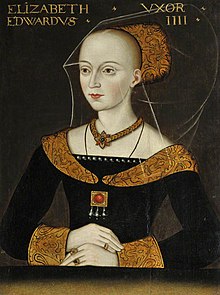
Back إليزابيث وودفيل Arabic اليزابيث وودفيل ARZ Sabela Woodville AST Elizabet Vudvil Azerbaijani الیزابت وودویل AZB Elizabeth Woodville BS Elisabet Woodville Catalan Alžběta Woodvillová Czech Elizabeth Woodville Welsh Elizabeth Woodville Danish
| Elizabeth Woodville | |
|---|---|
 Posthumous portrait, 16th century | |
| Queen consort of England | |
| Tenures |
|
| Coronation | 26 May 1465 |
| Born | c. 1437 Grafton Regis, Northamptonshire, England |
| Died | 8 June 1492 (aged 54–55) Bermondsey Abbey, Surrey, England |
| Burial | 12 June 1492 |
| Spouses |
|
| Issue more... | |
| Father | Richard Woodville, 1st Earl Rivers |
| Mother | Jacquetta of Luxembourg |
| Signature | |
Elizabeth Woodville (also spelt Wydville, Wydeville, or Widvile;[a] c. 1437[1] – 8 June 1492), later known as Dame Elizabeth Grey, was Queen of England from 1 May 1464 until 3 October 1470 and from 11 April 1471 until 9 April 1483 as the wife of King Edward IV. She was a key figure in the Wars of the Roses, a dynastic civil war between the Lancastrian and the Yorkist factions between 1455 and 1487.
At the time of her birth, Elizabeth's family was of middle rank in the English social hierarchy. Her mother, Jacquetta of Luxembourg, had previously been an aunt-by-marriage to King Henry VI, and was the daughter of Peter I, Count of Saint-Pol. Elizabeth's first marriage was to a minor supporter of the House of Lancaster, John Grey of Groby. He died at the Second Battle of St Albans in 1461, leaving Elizabeth a widowed mother of two young sons.
Elizabeth's second marriage, in 1464, to Edward IV became a cause célèbre. Elizabeth was known for her beauty but came from minor nobility with no great estates, and the marriage took place in secret. Edward was the first king of England since the Norman Conquest to marry one of his subjects,[2][3] and Elizabeth was the first such consort to be crowned queen.[b] The couple had ten children together. The marriage greatly enriched Elizabeth's siblings and children, but their advancement incurred the hostility of Richard Neville, Earl of Warwick, "The Kingmaker", and his various alliances with the most senior figures in the increasingly divided royal family. This hostility turned into open discord between King Edward and Warwick, leading to a battle of wills that finally resulted in Warwick's switching allegiance to the Lancastrian cause, and to the execution of Elizabeth's father, Richard Woodville, and her brother, John, by Warwick in 1469.
After the death of her husband in 1483, Elizabeth remained politically influential even after her son, briefly proclaimed King Edward V, was deposed by her brother-in-law, Richard III. Edward and his younger brother Richard both disappeared soon afterwards, and are presumed to have been murdered on Richard III's orders. Elizabeth subsequently played an important role in securing the accession of Henry VII in 1485.
Henry married Elizabeth's eldest daughter, Elizabeth of York, which ended the Wars of the Roses and established the Tudor dynasty. Through her daughter, Elizabeth Woodville was a grandmother of the future Henry VIII. Elizabeth was forced to yield pre-eminence to Henry VII's mother, Lady Margaret Beaufort; her influence on events in these years, and her eventual departure from court into retirement, remain obscure.[4][5]
Cite error: There are <ref group=lower-alpha> tags or {{efn}} templates on this page, but the references will not show without a {{reflist|group=lower-alpha}} template or {{notelist}} template (see the help page).
- ^ Karen Lindsey, Divorced, Beheaded, Survived, p. xviii, Perseus Books, 1995.
- ^ A Complete History of England with the Lives of all the Kings and Queens thereof; London, 1706. p. 486
- ^ Kennett, White; Hughes, John; Strype, John; Adams, John; John Adams Library (Boston Public Library) BRL (16 June 2019). "A complete history of England: with the lives of all the kings and queens thereof; from the earliest account of time, to the death of His late Majesty King William III. Containing a faithful relation of all affairs of state, ecclesiastical and civil". London: Printed for Brab. Aylmer ... – via Internet Archive.
- ^ Jewell, Helen M. (1996). Women in Medieval England. Manchester University Press. ISBN 9780719040177.
- ^ Baldwin, David (2002). Elizabeth Woodville : mother of the princes in the tower. Stroud, Gloucestershire: Sutton Pub. ISBN 9780750927741.